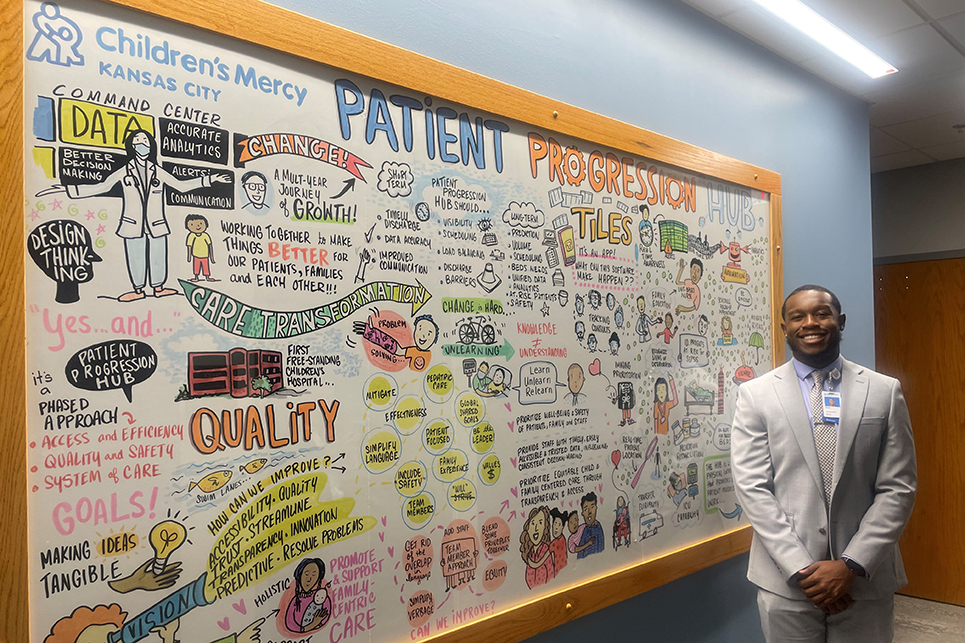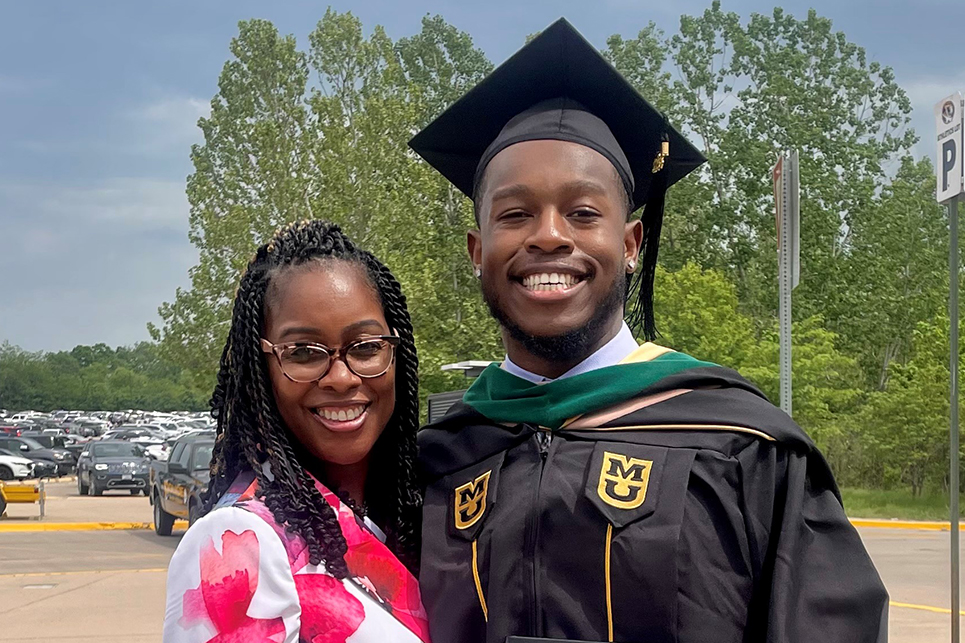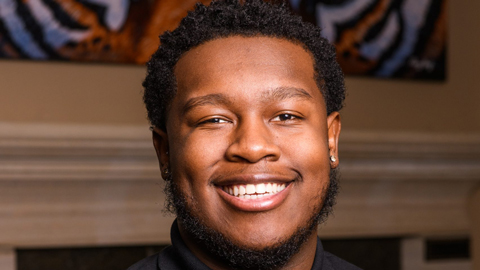News & Announcements
Full circle: CHS alum working to increase equity in health care
Oct. 3, 2023

Story by Cheri Ghan
When David Gardner reflects on his professional journey, he sums it up succinctly as a “full-circle moment.”
Gardner, BHS ‘21, MHA ‘23, MBA ‘23, grew up on the South Side of Chicago. He remembers losing friends to gun violence and seeing people struggle to get necessary services, including health care. He wanted to escape the former and be a change agent for the latter — he’s now doing both.
He came to the University of Missouri in the fall of 2017 with plans to major in animal science and become a veterinarian. After experiencing the twists and turns common to college life, Gardner discovered his strengths, his areas for growth and his passions. Through all of that, he underwent a career shift that promises to make him one of the most important people his patients will never know.
New directions
During his sophomore year, Gardner felt inspired to make a difference in the lives of people.
As most college students would do in such a situation, he began to explore other majors at Mizzou. He considered becoming a teacher, but he eventually decided he could do the most good by pursuing a Bachelor of Health Science with an emphasis in leadership and policy.
Gardner, a jovial and thoughtful person who has a knack for connecting with others, enjoyed classes like health care policy and ethics. He became a student ambassador and helped recruit new students to the college. Gardner also immersed himself in his coursework, making the Dean’s List every semester until he graduated in May 2021.
It was during his required Health Science internship that Gardner decided he wanted to pursue a career in health care management. He worked directly with CHS alum Wes Sconce, BHS-RT ‘94, MHA ‘10, who is a support services manager with the Missouri Orthopaedic Institute.
“What struck me most about Dave is how he uses his time and talent in such a concentrated and intentional way,” Sconce said. “I remember reviewing his resume and thinking he must be 35 years old to have accomplished all the great things he had accomplished. Between his employment and volunteer experience, only one of two things seemed possible: his days had more than 24 hours in them, or he never sleeps.”
Gardner was involved with a variety of projects during his time at MOI. Sconce said he was always engaged at the highest level, calling him “one of the most genuine people I have ever met.”
“His passion is evident by his actions; in his involvement with under-represented groups and personal engagement with under-served individuals,” Sconce added. “Just this week, I received a reference request because Dave has signed up to be a Big Brother in the Kansas City area.”
Gardner opted to double dip during his graduate studies, earning both a Master of Health Administration (MHA) and a Master of Business Administration (MBA) along with a certificate in Health Ethics — and he did it in two years rather than the typical three-year path for the dual program.
He said his CHS coursework prepared him for success in the programs by giving him a foundation in public health, epidemiology and the business side of health care. MHA graduates have the option of doing a one-year fellowship immediately after graduation. Gardner saw it as another opportunity to learn.
He landed a dream assignment at Children’s Mercy Hospital in Kansas City. By working on numerous projects alongside management mentors in different departments, the experience is giving him direct experience with how hospitals operate. It also allows him to pursue his greatest passion: community engagement in health care.

The Chicago connection
Community engagement is a bit like putting together a jigsaw puzzle.
It involves bringing together the myriad elements affecting a patient’s health care and lifestyle — including social determinants of health and other factors that make care more or less accessible — and trying to use that information to form a complete picture and identify existing barriers.
“Patients deal with food insecurities, housing insecurities, language barriers and many more barriers that will affect their overall health,” Gardner said. “Keeping the community you serve engaged and allowing them to play an active role in their own care is crucial. Connecting patients with resources that can improve their health and living circumstances is a big part as well.”
In many ways, this work brings Gardner back to the South Side of Chicago. Gardner’s mother had him when she was an undergraduate student, but she continued in her studies, eventually earned a Ph.D. and started a career as a college professor. His mom, his grandmother and other family members helped move him to Mizzou and stayed closely connected to him throughout his education.
Gardner said he had options and support many of his friends lacked, which he keeps in the back of his mind as he works to change health care for the better.
“It is extremely important for us to get closer to more equitable care for all,” he said. “Growing up, I saw people unable to receive the care they needed for a multitude of reasons. To be in a position all these years later in which I can help get others the resources they need to live healthier lives is an amazing full-circle moment.”
Sconce has no doubt Gardner will have an impactful career.
“The best way to summarize my impression of Dave, the inevitability of his personal success and his impact on the world, was in a letter of recommendation I wrote for a scholarship for which he applied: ‘Dave Gardner is a young man for whom future scholarships will be named,’” Sconce said.
